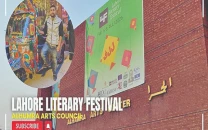Musically challenged
Peshawar’s talented musicians struggle to make themselves heard in an unfriendly market.

However, the deteriorating domestic security situation, coupled with the financial crisis and an ongoing tussle between record labels and musicians has stunted the progress of a promising industry.
Piracy has affected musicians such as Irfan Khan, who claims his albums are pirated instantly. Secondly, another problem Khan says that affects how his music is perceived is that his songs are lifted and used in the soundtrack of the ‘mini or CD films’, which have replaced the Pashto film industry.
“I tried taking legal action once,” Khan tells The Express Tribune. “One of my most popular songs was pirated. But we couldn’t do anything about it. Even if my song was not copyrighted legally, my voice is registered with God. They can’t steal that. What can we do? There is such exploitation. We can’t pick up a gun and ask them not to.”
Another problem in Peshawar is the lack of performance venues. Musician Aamer Shafiq says, “There is no platform. There is no light at the end of the tunnel. Even if there are gigs outside, the audiences aren’t ready for different music ... they’re scared to express themselves.”
The wave of almost weekly bomb blasts in the city in 2009 turned the city into a criss-cross of check points and barricades. According to Shafiq: “We used to be able to take our guitars to Subway and jam there. We can’t even do that now.”
Peshawar’s residents point to Nishtar Hall as a symbol of wasted opportunities. The venue, which can seat approximately 400 people, used to be a hub for cultural events. It has been closed for public performances since the Muttahida Majlis-e-Amal government ordered it shut in 2002, and since then has only been used recently on a few occasions by the provincial government or private organisations. The current Khyber-Pakhtunkhwa government had announced in 2008 that the hall would be reopened.
Even though music is a huge part of the culture in the province and the Federally Administered Tribal Areas, becoming a full-time musician is a challenge. Concerns about the long-term sustainability of a musical career are strong enough for most musicians to hold day jobs. Many families do not find it acceptable for their children to become musicians. But this varies from city to city and household to household.
“I had to lie to buy my first guitar with my tuition fees,” Shafiq laughingly says. “I told my parents I was taking two tuitions and used the money for one to buy it. I learned everything online, had to sneak off to a cyber cafe to do that. “
“You’ll be stunned at seeing how good the musicians are here without a proper music education, and facilities an opportunities to perform. But we need government support. The youth itself cannot do everything. It’s a two-way traffic.”
Published in The Express Tribune, July 4th, 2010.



















COMMENTS
Comments are moderated and generally will be posted if they are on-topic and not abusive.
For more information, please see our Comments FAQ